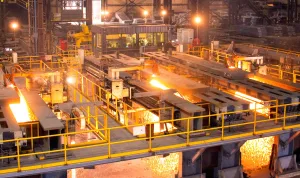How Do Local Steel Producers Address Environmental Sustainability in Hong Kong?

As the global focus on sustainability intensifies, the steel industry is facing increasing pressure to reduce its environmental impact. In Hong Kong, local steel producers are taking significant steps to address environmental sustainability while maintaining productivity and competitiveness. This article explores the strategies and initiatives employed by these producers to minimize their ecological footprint and contribute to a more sustainable future.
1. Understanding the Environmental Impact of Steel Production
Steel production is traditionally associated with high energy consumption and substantial carbon emissions. In Hong Kong, where urbanization and construction activities are rampant, addressing these environmental concerns is critical. The steel industry plays a pivotal role in achieving the region’s sustainability goals by implementing practices that reduce resource consumption, waste, and emissions.
2. Innovative Production Technologies
A. Electric Arc Furnace (EAF) Technology
One of the most significant advancements in steel production is the shift toward Electric Arc Furnace (EAF) technology. Unlike traditional blast furnaces that rely on coal, EAFs use electricity to melt recycled steel scrap. This method drastically reduces carbon emissions and energy consumption. Many local steel producers in Hong Kong are investing in EAF technology to enhance their sustainability efforts while maintaining efficiency.
B. Hydrogen-Based Steelmaking
Emerging technologies, such as hydrogen-based steelmaking, are also being explored. This process involves using hydrogen instead of carbon to reduce iron ore, which could potentially eliminate carbon emissions associated with steel production. Although still in the experimental stage, local producers are collaborating with research institutions to explore this innovative approach.
3. Waste Reduction and Recycling Initiatives
A. Recycling Scrap Steel
Recycling is a cornerstone of sustainability in the steel industry. Hong Kong’s steel producers are actively engaging in recycling programs that prioritize the use of scrap steel in production. By incorporating recycled materials, companies can reduce their reliance on virgin resources and minimize waste.
B. Waste Management Practices
Efficient waste management practices are crucial for reducing the environmental impact of steel production. Local producers are implementing systems to capture and recycle by-products, such as slag and dust, generated during the production process. These by-products can be repurposed in construction materials, thereby reducing landfill waste and promoting a circular economy.
4. Energy Efficiency Measures
A. Renewable Energy Sources
To further enhance sustainability, many steel producers in Hong Kong are investing in renewable energy sources. By incorporating solar panels, wind energy, and other renewable resources into their operations, companies can reduce their carbon footprint and reliance on fossil fuels. This shift not only supports environmental goals but can also lead to long-term cost savings.
B. Energy Management Systems
Implementing energy management systems allows steel producers to monitor and optimize energy consumption throughout their operations. These systems help identify areas for improvement, enabling companies to implement energy-saving measures that reduce overall consumption and emissions.
5. Collaboration with Stakeholders
A. Partnerships with Research Institutions
Local steel producers are increasingly collaborating with research institutions and universities to develop innovative solutions for sustainability. These partnerships facilitate knowledge sharing and the exploration of cutting-edge technologies that can enhance environmental performance in steel production.
B. Engagement with Regulatory Bodies
Staying compliant with environmental regulations is essential for steel producers. By actively engaging with local regulatory bodies, companies can stay informed about new policies and standards related to sustainability. This proactive approach ensures that they are prepared to meet environmental requirements and implement best practices.
6. Sustainable Supply Chain Management
A. Sourcing Eco-Friendly Materials
Local steel producers are placing a greater emphasis on sourcing eco-friendly materials from suppliers who adhere to sustainable practices. This includes selecting suppliers who prioritize the use of recycled materials and demonstrate a commitment to reducing their environmental impact.
B. Transportation and Logistics Optimization
Minimizing the carbon footprint associated with transportation is another important aspect of sustainability. Steel producers are optimizing their logistics and supply chain management to reduce emissions related to the transport of raw materials and finished products. This includes exploring more efficient transportation methods and routes.
7. Community Engagement and Corporate Social Responsibility (CSR)
Local steel producers in Hong Kong are increasingly recognizing their role in the community. By engaging in corporate social responsibility (CSR) initiatives, these companies are promoting environmental awareness and sustainability among employees, stakeholders, and the wider community.
A. Educational Programs
Many steel producers are investing in educational programs to raise awareness about sustainability and environmental practices. By fostering a culture of sustainability within their organizations and the community, these companies contribute to a more environmentally-conscious society.
B. Supporting Local Environmental Initiatives
Through partnerships with local NGOs and environmental organizations, steel producers are supporting initiatives aimed at preserving natural resources and promoting sustainable practices. This collaboration reinforces their commitment to environmental sustainability and helps create a positive impact in the community.
Conclusion
Local steel producers in Hong Kong are taking significant strides toward addressing environmental sustainability in their operations. By adopting innovative technologies, implementing recycling initiatives, optimizing energy consumption, and engaging with stakeholders, these companies are reducing their ecological footprint while ensuring the ongoing productivity of the steel industry. As sustainability becomes increasingly important, the efforts of local producers will play a crucial role in shaping a greener future for Hong Kong’s steel market and beyond.



